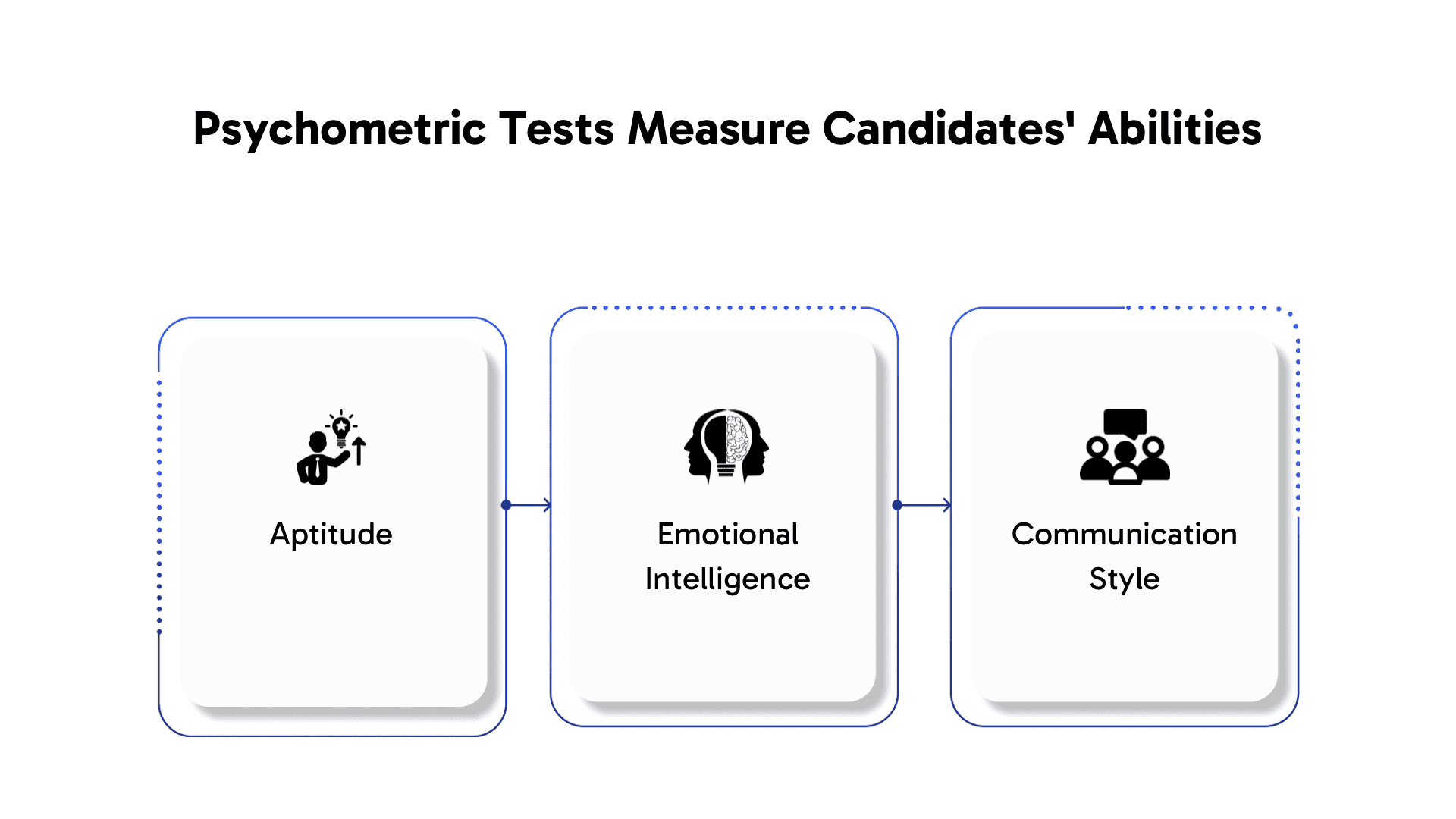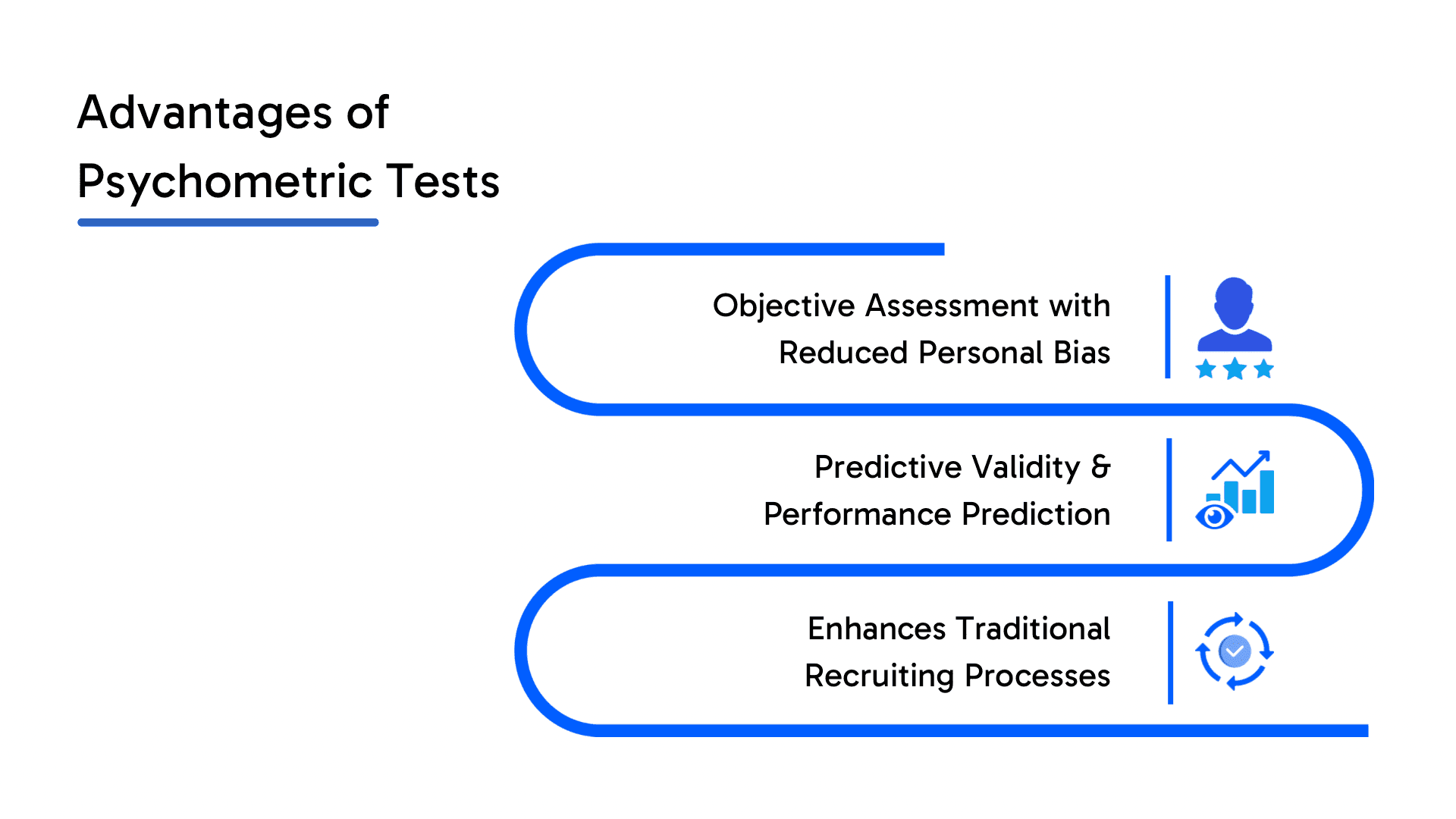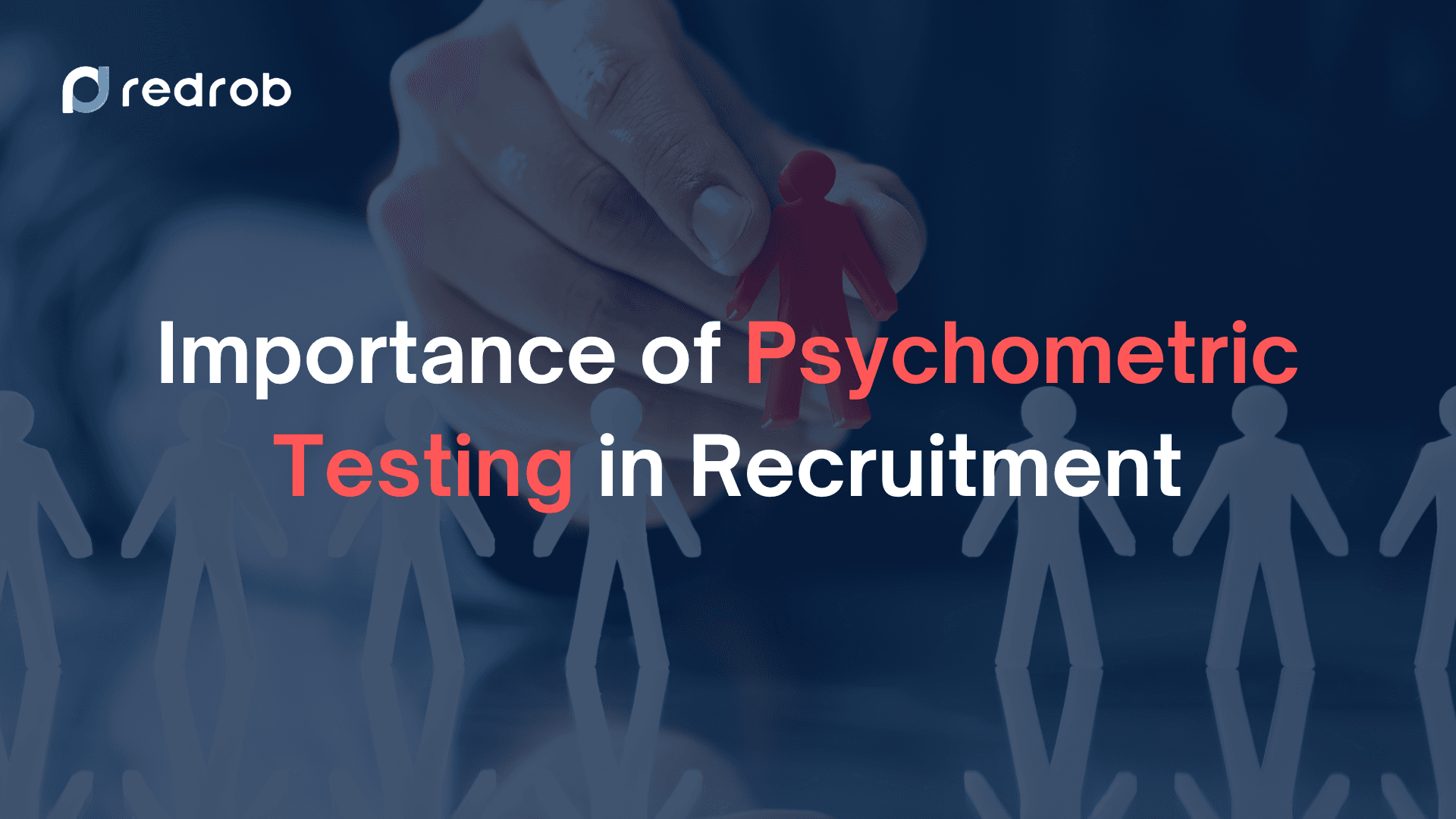Psychometric Testing
8 min read
•
Nov 4, 2024

Soumyata Singh
Are you tired of hiring the wrong people? Do you want to streamline your recruitment process and find candidates who are a perfect fit for your company? This is why psychometric testing in recruitment is so important.
Psychometric testing is a valuable tool that helps you assess a candidate's personality, skills, and abilities. This information can be used to predict job performance and identify potential red flags.
In this blog, we discuss why psychometric testing is important in recruitment. We will also explore the different types of psychometric tests, the benefits of using them, and some of the challenges that you may face. Want to know all of it? Keep reading!
Understanding Psychometric Testing
Psychometric testing is a tool used to assess a candidate's mental and emotional traits. It gives recruiters objective insights into a person's personality, behavior, and cognitive abilities. This is why psychometric testing in recruitment has become a reliable way to predict job performance.
Types of Skills and Traits Evaluated
Psychometric tests evaluate a range of skills and characteristics, helping you make better hiring decisions. Common skills measured include:
Cognitive ability (problem-solving, logic, and reasoning)
Emotional intelligence (empathy, self-awareness)
Communication style (interaction and collaboration)
Personality traits (extroversion, agreeableness)
With these different types of psychometric tests, you can get a better understanding of a candidate’s potential to succeed in a specific role.
Psychometric testing has a long history. Initially, these tests focused on cognitive abilities, such as IQ. Over time, their scope widened to include personality assessments, measuring factors like emotional intelligence and communication style. Today, psychometric testing is integral to modern recruitment, offering a balanced view of both skills and personality traits.
Psychometric testing continues to evolve, particularly in recruitment, to provide relevant insights into potential employees.

Next, let’s explore the key traits psychometric tests measure and how they help match candidates with the right roles.
Key Traits Measured by Psychometric Tests
Psychometric tests assess a range of important traits that are crucial in recruitment. These tests help you understand a candidate’s aptitude, emotional intelligence, and communication style. By measuring these traits, you can evaluate how well a candidate fits the role and the workplace. This is one of the key benefits of psychometric testing in recruitment.
Aptitude, Emotional Intelligence, and Communication Style

Psychometric tests are designed to measure multiple areas of a candidate’s abilities:
Aptitude: This evaluates logical reasoning, problem-solving, and the ability to learn new skills. It’s essential in roles requiring quick thinking and decision-making. Cognitive ability tests are the best to accurately predict job performance.
Emotional Intelligence: Emotional intelligence (EI) refers to a candidate’s ability to manage emotions and understand others’ feelings. It plays a major role in teamwork and leadership roles. High EI is often linked to better collaboration and conflict resolution in the workplace.
Communication Style: How a person communicates—whether assertive, passive, or collaborative—impacts team dynamics. A psychometric test gives insights into whether a candidate's style matches your team’s culture.
These traits are crucial for determining a candidate’s potential for success.
Importance of Matching Personality to Job Role
One major benefit of psychometric testing in recruitment is its ability to match a candidate’s personality to the job role. Every job requires different personality traits. For example, an introverted candidate may perform better in research-based roles, while an extrovert may thrive in sales or customer service. By understanding personality types, you can place candidates in roles where they’re most likely to succeed. According to research, when personality and job roles align, employee retention and satisfaction improve significantly.
Assessing Candidate’s Workplace Suitability
Psychometric testing also helps you assess whether a candidate will fit into your company’s work environment. Workplace suitability includes how well they handle stress, adapt to change, and function within a team. For example, candidates with high resilience and adaptability are likely to thrive in fast-paced environments. Using psychometric tests ensures you're evaluating not just technical skills but how candidates will perform in the work culture.
These key traits offer valuable insights into selecting the best candidate. Next, let us see how psychometric testing provides deep insights into personality, behavior, and cognitive abilities in recruitment.
Application and Benefits in Recruitment
Psychometric testing offers valuable insights into candidates, making it a powerful tool in recruitment. It helps you assess personality, behavior, and cognitive abilities, giving you a clear view of a candidate’s potential. This is why psychometric testing in recruitment has gained popularity in recent years.
Insights into Personality, Behavior, and Cognitive Abilities
Psychometric tests help you evaluate traits beyond technical skills. They provide a deeper look into a candidate’s personality, behavior, and cognitive abilities. Cognitive tests measure problem-solving skills, while personality tests assess emotional stability and how well a person works under stress. These insights allow you to make more informed decisions about a candidate’s overall fit for the role.
For example, a candidate applying for a management position might score high in leadership and decision-making abilities, giving you confidence in their suitability. This level of insight is one of the key reasons why psychometric testing in recruitment has become a standard practice.
Predictive of Job and Organizational Performance
Another significant benefit of psychometric testing in recruitment is its ability to predict job performance. These tests assess the soft skills needed to succeed in a particular job role. Cognitive ability tests have a high predictive validity and can help predict a candidate's future job performance.
In addition, psychometric tests are highly effective in predicting long-term organizational performance. By hiring candidates whose personalities align with your company’s values, you can improve retention rates and overall productivity.
Cost-Effectiveness and Efficiency Through Online Administration
Psychometric testing is also cost-effective, especially when done online. Online platforms allow you to administer tests quickly and efficiently. This reduces the time and cost associated with traditional recruitment processes, such as multiple interviews or lengthy screening methods.
Since psychometric tests can be taken remotely, you also expand your talent pool by allowing candidates from different locations to apply. This is another reason why psychometric testing in recruitment is becoming a go-to approach among many companies. Know more about how companies use psychometric tests to build high-performance teams.
Psychometric tests clearly offer valuable insights, and their benefits extend beyond just hiring the right people.
Now, let’s explore how psychometric testing enhances traditional recruiting processes by providing objective and reliable assessments.
Advantages of Psychometric Tests

Psychometric tests offer several advantages that can transform your hiring process. From reducing bias to enhancing performance prediction, these tests give you a clearer view of candidate potential. This is why psychometric testing in recruitment has become a preferred tool for many organizations.
Objective Assessment with Reduced Personal Bias
One of the main benefits of psychometric testing in recruitment is its ability to provide objective assessments. Unlike interviews, which may be influenced by personal bias, psychometric tests deliver results based on data. They evaluate a candidate's abilities and personality traits impartially. Structured assessments like these are more reliable than unstructured interviews.
This level of objectivity helps you focus on actual performance indicators rather than gut feelings or first impressions.
Predictive Validity and Performance Prediction
Psychometric tests are also known for their strong predictive validity. They are designed to forecast future job performance based on current abilities and traits. Cognitive ability tests, for example, are excellent predictors of job success, with notable accuracy in predicting performance.
When you use these tests, you're not just evaluating a candidate's present skills; you're also assessing their potential to grow and succeed in your organization.
Enhances Traditional Recruiting Processes
Psychometric testing doesn’t replace traditional recruitment methods; it enhances them. You can combine these tests with interviews and reference checks to create a well-rounded evaluation process. By adding psychometric testing, you reduce the guesswork and make more data-driven hiring decisions.
Combining psychometric results with role-specific interviews ensures that you're evaluating both hard skills and workplace fit. This layered approach leads to better hiring outcomes and improves retention.
The benefits of psychometric testing in recruitment extend beyond objective assessments, making your recruitment process more efficient and reliable.
Moving ahead, let’s look at how technology has integrated psychometric tests into modern recruitment, expanding the talent pool and improving consistency.
Challenges and Considerations
While psychometric testing is a valuable tool, it’s important to recognize its limitations. Understanding these challenges helps you use these tests more effectively in your recruitment process. Here’s a closer look at some common considerations.
Potential Biases and Limitations of Psychometric Tests
Psychometric tests aim to be objective, but biases can still creep in. Cultural differences or language barriers may affect how candidates interpret questions, leading to inaccurate results. Additionally, no test is perfect. Over-reliance on them can overlook key factors, such as a candidate’s motivation or unique skill set.
For instance, research shows that psychometric tests can favor certain demographics . This is one reason why psychometric testing in recruitment should be used with caution, ensuring fairness for all candidates.
Effectiveness Varies by Context and Job Role
The effectiveness of psychometric tests isn’t one-size-fits-all. Some roles require different personality traits or skill sets, which may not be captured fully by a test. For example, a psychometric test that works well for evaluating customer service skills may not work as effectively for technical or creative roles.
You should adapt your assessment strategy based on the specific job requirements. This flexibility highlights the need for customizing tests to match the context of the role.
Importance of Complementing with Other Assessment Methods
While the benefits of psychometric testing in recruitment are clear, it’s essential to combine these tests with other assessment methods. Structured interviews, skill tests, and work simulations can give you a more complete picture of a candidate's potential. This multi-faceted approach ensures you’re not basing decisions solely on one type of test.
For example, Google is known for combining psychometric tests with project-based assessments to evaluate technical skills and fit.
By addressing these challenges, you can better integrate psychometric testing into your recruitment strategy.
Turn to Redrob for Better and Reliable Candidate Assessment
Psychometric testing offers clear benefits in recruitment. It gives you insights into candidates' personalities, cognitive abilities, and workplace behaviors. These tests also reduce personal bias, making your hiring process more objective. This is why psychometric testing in recruitment is becoming a reliable tool for many organizations.
Scientific credibility backs these assessments, helping you predict job performance more accurately. When you integrate psychometric testing with other tools like interviews and skills tests, your recruitment process becomes stronger and more balanced.
By using a mix of methods, you can make well-rounded decisions and find the best fit for your team.
Redrob offers you the best collection of candidate assessment tests from core skill-based tests for specific jobs to psychometric and behavioral analysis. You get:
Online interviews structured according to your organizational format
AI-powered psychometric tests and analysis
350+ skill-based assessment tests with free-of-cost customization
Easy management with our state-of-art ATS
These solutions can help you save 88% of hiring costs. Explore our solutions.



